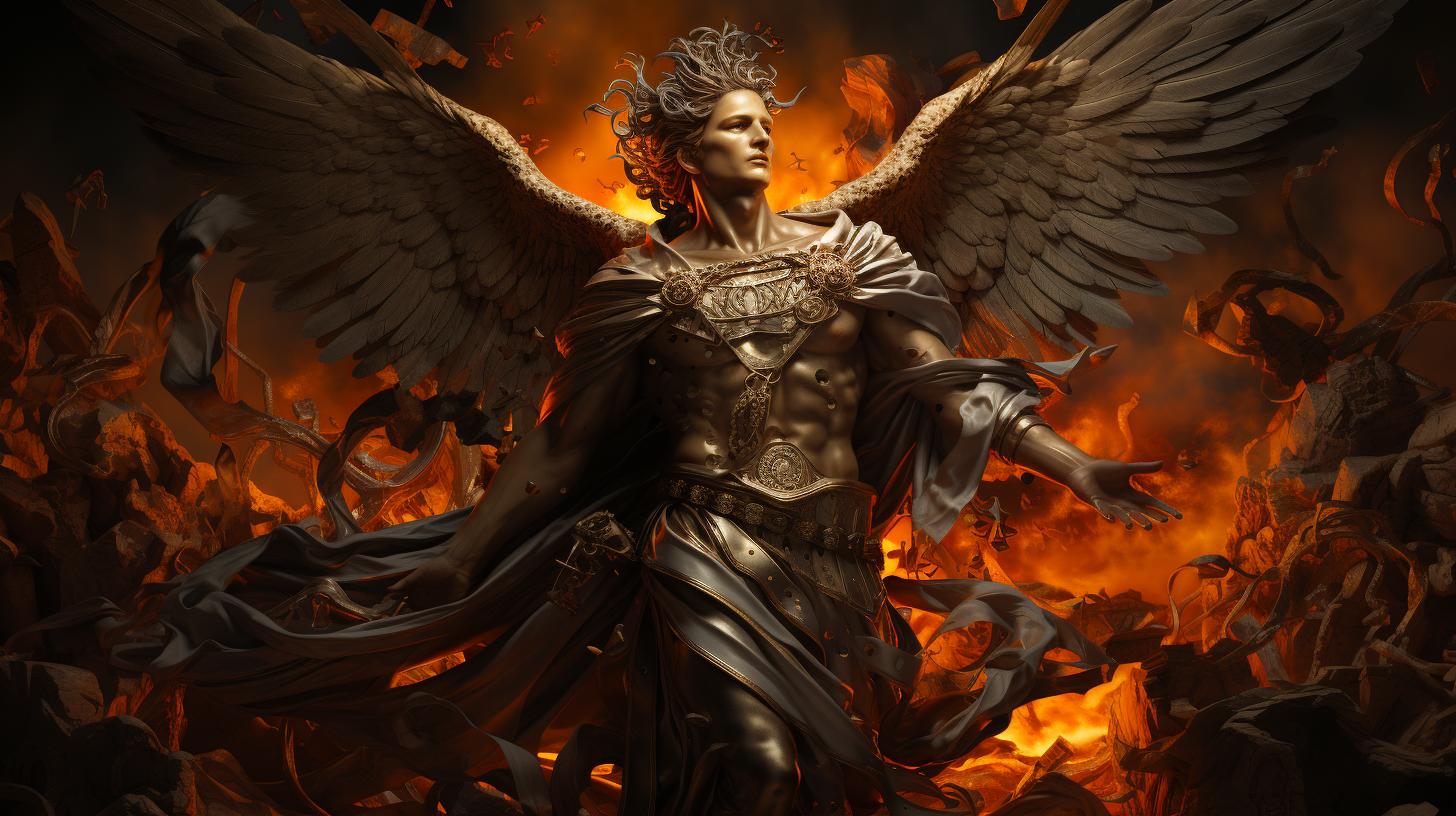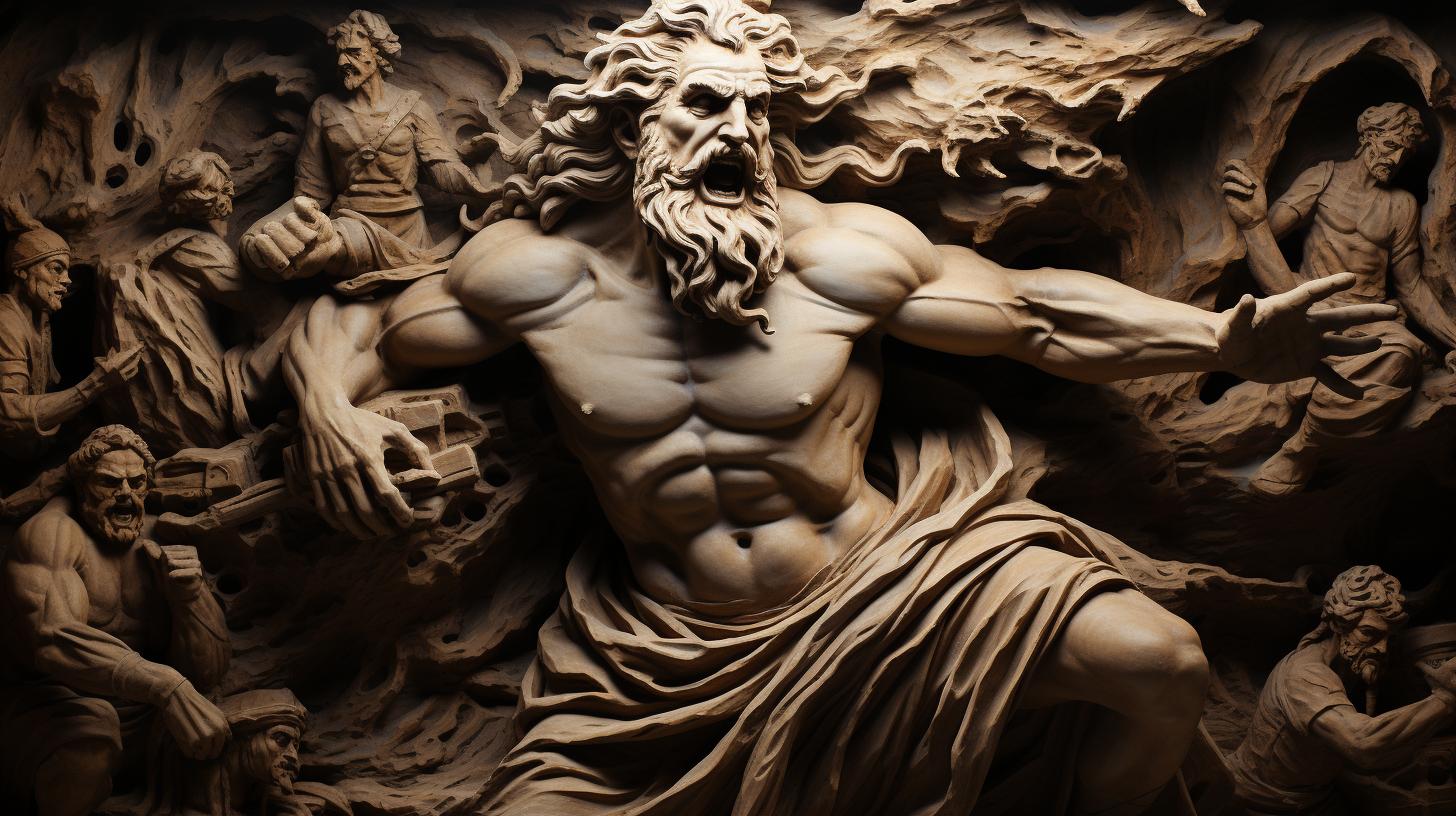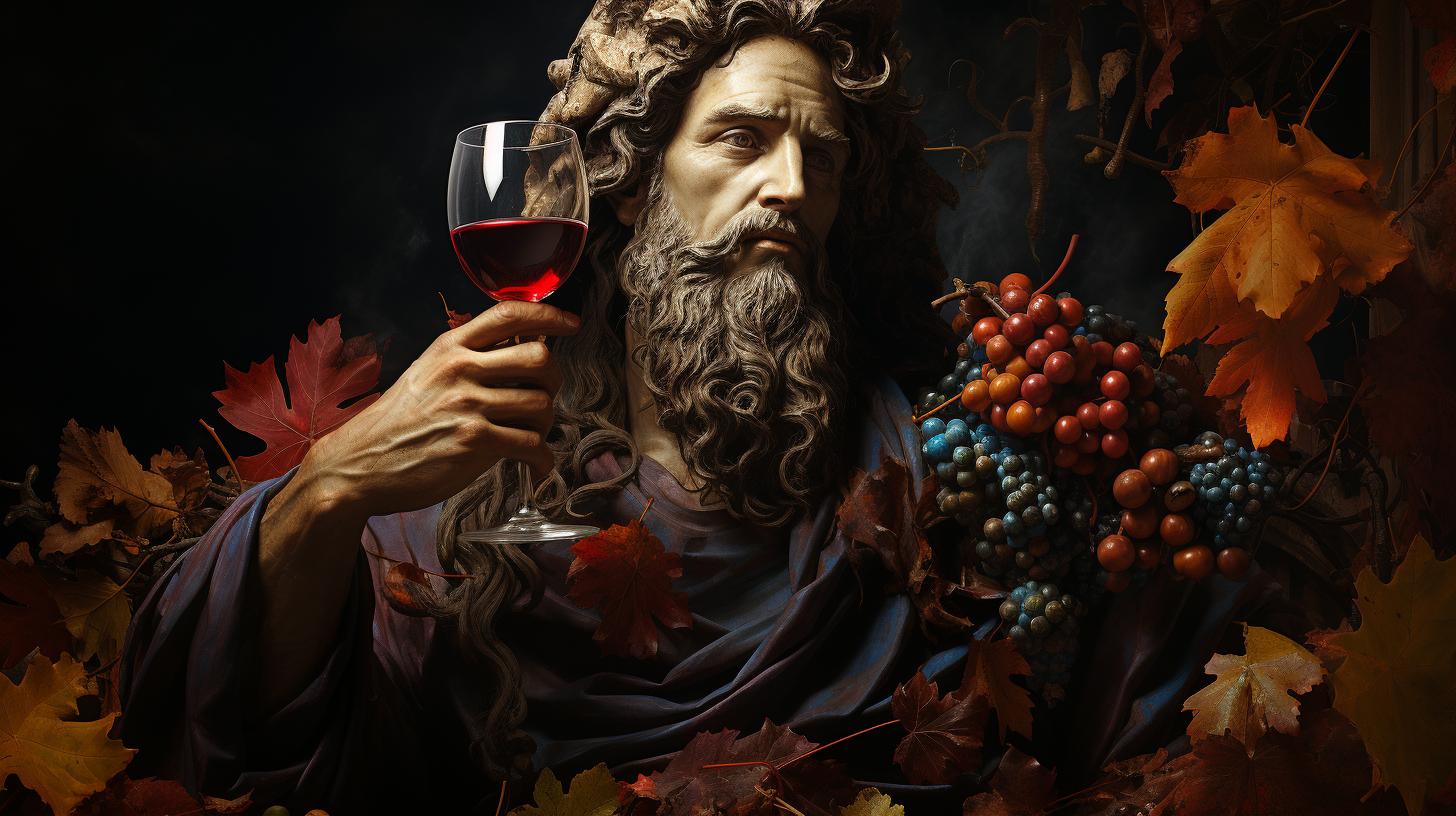Hestia Greek Goddess: The Sacred Role of the Domestic Deity in Ancient Greece

Hestia Greek goddess, also known as Vesta in Roman mythology, was revered as the virgin goddess of the hearth and home. Born to Kronos and Rhea, she was one of the Twelve Olympians.
Hestia’s role as the goddess of the hearth involved receiving a portion of every sacrifice, symbolizing domestic happiness and blessings. She resided within the inner part of every house and was closely associated with Zeus, Hermes, Apollo, and Poseidon. Worship of Hestia, Apollo, and Poseidon took place at temple sites like Delphi and Olympia.
In Roman mythology, Hestia, as Vesta, held a similar position and was honored through the constant presence of a sacred fire tended by priestesses.
The Birth and Early Life of Hestia
Hestia, the Greek goddess of the hearth and home, has an intriguing story surrounding her birth and early life.
As the daughter of Kronos and Rhea, she was one of the Twelve Olympians, the most significant deities in Greek mythology.
According to legend, Hestia faced a dramatic fate at birth.
Her father, Kronos, fearful of a prophecy that one of his children would overthrow him, swallowed each of his offspring, including Hestia, immediately upon their birth. However, due to the intervention of Zeus, Hestia and her siblings were later disgorged from their father’s belly.
Following her release, Hestia embarked on her divine journey. She showed remarkable qualities from a young age, demonstrating wisdom, purity, and a deeply nurturing essence. Her unwavering commitment to remaining a virgin led Zeus to grant her eternal chastity, permitting her to focus solely on her sacred role as the goddess of the hearth and home.
Hestia’s early life is further characterized by her significant association with the concept of domesticity. Even as a child, she displayed a profound connection with the hearth, which became the focal point of her divine duties.
The hearth, representing the sacred center of family life, was believed to be Hestia’s dwelling place, providing warmth, sustenance, and protection to households.
It is within the context of her birth and early experiences that we gain a deeper understanding of Hestia’s divine nature and the crucial role she played in ancient Greek society.
She would go on to influence and bless homes, receive offerings, and contribute to the overall harmony and well-being of families throughout the ages.
The Twelve Olympians and Hestia’s Family
Hestia, the Greek goddess of the hearth and home, was part of the esteemed Twelve Olympians. She was born to Kronos and Rhea, who were also prominent figures in Greek mythology.
As a daughter of these revered deities, Hestia held a significant place within the Greek pantheon.
The Twelve Olympians comprised the major gods and goddesses who ruled over Mount Olympus, the mythical dwelling place of the gods.
Hestia shared this divine lineage with her siblings, which included Zeus, Poseidon, Hades, Hera, Demeter, and Hestia herself, among others.
Hestia’s family dynamic played a crucial role in shaping her character and responsibilities.
Kronos, her father, famously swallowed Hestia and her siblings upon their birth out of fear of a prophecy that predicted his downfall at the hands of his own children. However, Zeus, the youngest of the siblings, managed to rescue his siblings by cunningly tricking Kronos into disgorging them.
While Zeus grew to become the king of the gods, Hestia emerged as the virgin goddess of the hearth and home. Despite her critical role within the Olympian family, Hestia’s choice to remain unmarried and maintain her eternal virginity set her apart from her siblings.
Her decision was respected by Zeus, solidifying her status as a revered deity in her own right.
Throughout Greek mythology, the Twelve Olympians and the intricate relationships between family members underscored the overall power dynamics and divine dynamics of the pantheon.
Within this esteemed group of gods and goddesses, Hestia’s importance as the goddess of the hearth stood strong, highlighting the sacredness and significance placed upon domesticity and familial life.
Hestia’s Role as the Goddess of the Hearth
In Greek mythology, Hestia is revered as the goddess of the hearth, symbolizing the sacred center of domestic life.
Her role in ancient Greek society was vital, as she presided over the warmth and protection of every household’s hearth.
As the goddess of the hearth, Hestia held great significance in religious rituals and practices.
She was honored with the first offering in every sacrificial ceremony to the gods. This act showcased her crucial role in ensuring the divine favor and blessings for the household.
Hestia’s presence within every home was believed to bring about domestic happiness and harmony.
She was associated with peaceful and nurturing qualities, providing a sense of stability and security in the household. Families sought her protection and guidance, seeking refuge at the hearth during difficult times.
Furthermore, Hestia’s connection with the hearth extended beyond the realm of private homes. She was revered at public hearths as well, such as the prytaneum, which served as a sanctuary and focal point for communal activities in ancient Greek cities.
Hestia’s sacred duty as the guardian of the hearth was intertwined with her divine siblings. She maintained a close association with Zeus, the king of the gods, as well as Hermes, the messenger of the gods.
This connection symbolized the interplay between the domestic realm represented by Hestia and the larger outdoor world represented by Zeus and Hermes.
In solemn oaths and pledges, Hestia held a special place.
She was invoked first, highlighting her crucial role in ensuring the integrity and honesty of any commitment. Her presence in the worship of other deities, notably Apollo and Poseidon, showcased her influence and importance in various religious practices.
Although Hestia/Vesta had a similar role in Roman mythology, her essence as the goddess of the hearth and home remained unchanged. The Romans also revered her through the perpetual burning of a sacred fire tended by priestesses, signifying her eternal presence and protection.
Through Hestia’s role as the goddess of the hearth, both ancient Greeks and Romans experienced her power, blessings, and the comforting warmth she brought into their homes and communities.
Hestia and Domestic Happiness
Hestia, the Greek goddess of the hearth, holds a significant role in bringing domestic happiness and blessings to households.
As the Virgin Goddess of the Home, she embodies the warmth, stability, and harmony that permeate within the walls of every house.
In ancient Greece, Hestia was honored with the first offering in every sacrifice.
Her presence ensured the well-being of the family and the prosperity of their home. The hearth, considered a sacred center of domestic life, served as a place of gathering and nourishment, both physically and spiritually.
- Under Hestia’s protection, homes became havens of comfort and security.
- Families found solace and rejuvenation in their sanctuary, free from worldly troubles.
- Hestia’s essence infused the atmosphere with a sense of tranquility and contentment.
By focusing on the hearth, families were reminded to cherish the simple joys of shared meals, storytelling, and bonding.
Hestia’s reverence allowed individuals to embrace the importance of kinship and togetherness, fostering deeper connections within their households.
Furthermore, supplicants could seek refuge and protection at the hearth, finding a sanctuary in times of distress or conflict.
Hestia’s gentle presence eased troubled hearts and provided a sense of stability amidst the chaos of the outside world.
Overall, Hestia’s association with domestic happiness emphasized the significance of a harmonious home life.
Her divine influence enabled families to cultivate love, unity, and a genuine sense of belonging within their personal spaces, promoting emotional well-being and strengthening the foundations of their households.
The Sacred Centers: Hestia’s Connection with Every House
Hestia, the Greek goddess of the hearth, had a special connection with every house, viewing the hearth as a sacred center of domestic life.
In Greek culture, the hearth was considered the heart of the home, representing warmth, nourishment, and protection for the family. Hestia was believed to reside within the inner part of each house, symbolizing her role in bringing harmony and stability to the household.
The presence of Hestia in every home was significant, as she was seen as the giver of domestic happiness and blessings. Her influence extended beyond physical boundaries, as supplicants could seek protection and solace at the hearth.
Whether it was lighting the fire, preparing meals, or gathering around for family rituals and celebrations, the hearth was a central focal point in ancient Greek households.
As part of Hestia’s connection with every house, she received a share of every sacrifice offered to the gods.
In each religious ceremony, the first offering was dedicated to Hestia, emphasizing her importance as the divine guardian of the home. This practice reinforced the belief that the prosperity and well-being of the entire family depended on Hestia’s favor.
Furthermore, Hestia’s presence in every house was not limited to Greece alone. In Roman mythology, where she was known as Vesta, the worship of Hestia/Vesta revolved around the hearth in both private homes and public spaces.
The sacred fire, representing the presence and protection of the goddess, was kept burning at all times. Priestesses, entrusted with tending to the eternal flame, remained celibate as a symbol of their dedication to Hestia/Vesta.
The connection between Hestia and every house exemplified the significance of the hearth and its role in fostering harmony, unity, and domestic bliss.
Hestia’s influence permeated through the daily lives of ancient Greeks and Romans, reminding them of the sacredness of their households and the importance of cherishing and maintaining their homes as centers of warmth, love, and familial bonds.
Hestia’s Associations with Other Olympian Deities
As a significant member of the Twelve Olympians, Hestia held strong connections with other deities within the pantheon. Her role as the goddess of the hearth brought her close associations with several prominent gods and goddesses.
- Zeus: Hestia’s relationship with Zeus was particularly close, as they were both children of Kronos and Rhea. Zeus respected Hestia’s vow of eternal virginity, and she was honored with the first offering in every sacrifice, signifying her crucial role in domestic life.
- Hermes: Hestia shared a relationship with Hermes, the messenger of the gods.As the hearth symbolized both the inner sanctuary of the home and the gathering place for community affairs, Hestia’s connection with Hermes complemented the convergence of domestic and public life.
- Apollo: Though Hestia rejected Apollo’s marriage proposal, there existed a notable connection between the two.Together with Poseidon, they were worshipped at the sanctuary of Delphi, symbolizing the interdependence of Hestia’s domestic domain and the broader realms of prophecy and the sea.
- Poseidon: Hestia and Poseidon also shared a special bond, which was demonstrated through their joint worship in Olympia.This association represented the integration of Hestia’s role in home and hearth with Poseidon’s dominion over the seas.
These connections highlight the intricate network between Hestia and her fellow Olympians.
They exemplify her role as a unifying force, bridging the realms of domestic life, communal affairs, wisdom, and the natural elements.
Worship of Hestia, Apollo, and Poseidon
The worship of Hestia, Apollo, and Poseidon held significant importance in ancient Greek society. These three deities were honored together at the temple of Delphi and the sanctuary of Olympia.
As the goddess of the hearth, Hestia played a vital role in all sacrifices. She was invoked first in solemn oaths, emphasizing her significance in domestic life. Hestia’s connection with Apollo and Poseidon symbolized the balance between the indoor and outdoor worlds.
At the temple of Delphi, where Apollo was worshipped as the god of prophecy, Hestia was also venerated as the guardian of the sacred fire. Her role in maintaining the eternal flame brought purity and protection to the community.
Poseidon, the god of the sea, shared a connection with Hestia at the sanctuary of Olympia. As worshippers sought the blessings of Poseidon, they also paid homage to Hestia, recognizing the importance of her presence in their homes and lives.
Offerings and sacrifices made to Hestia, Apollo, and Poseidon consisted of various elements such as fruit, water, oil, wine, and one-year-old cows. These rituals aimed to show reverence and seek blessings from these deities for both domestic happiness and prosperity.
The worship of Hestia, Apollo, and Poseidon exemplified the interconnectedness of domestic life, divine protection, and the natural world in ancient Greek culture. By honoring these three deities, individuals sought to ensure harmony and well-being in their households and communities.
The Prytaneum: Sanctuaries of Hestia
Within ancient Greek society, the sanctuaries of Hestia, known as Prytaneums, held significant importance. These sacred central hearths were considered the dwelling places of Hestia, where her presence brought protection and blessings to the community.
Each Prytaneum was revered as a sanctuary, serving as a communal gathering space and a symbol of unity. Here, citizens would come together for important occasions, such as state assemblies, official meetings, and public festivals.
The Prytaneum provided a sense of belonging and played a crucial role in maintaining social harmony.
The architecture of Prytaneums varied, but they often featured an enclosed courtyard with a central hearth where the sacred fire of Hestia burned constantly.
This eternal flame represented the perpetual presence and watchfulness of the goddess, ensuring the welfare and prosperity of the community.
At every Prytaneum, the sacred flame was diligently tended by priestesses, known as Vestal Virgins in the Roman tradition.
These devoted women led lives of celibacy and were responsible for keeping the fire alive. Their duty was a sacred trust, as the extinction of the flame was believed to bring misfortune and calamity.
As the sanctuaries of Hestia, Prytaneums played a significant role in religious and civic activities. Together with the other Olympian deities, Hestia was invoked at these sacred spaces during important ceremonies and state functions, ensuring the community’s connection with their divine protectors.
Throughout Greece, the Prytaneums represented the unifying power of Hestia, bringing people together in a common bond. They served as symbols of stability, protection, and the shared values that formed the foundation of Greek society.
Hestia/Vesta in Roman Mythology
In Roman mythology, Hestia was known as Vesta and played a significant role as the goddess of the home, hearth, and domestic life. Similarly to her Greek counterpart, Vesta was highly revered and honored within Roman society.
The worship of Hestia/Vesta centered around the concept of the hearth, both in private households and public spaces. A sacred fire, symbolizing the presence and protection of the goddess, was kept burning continuously in temples dedicated to Vesta.
Vesta’s worship was entrusted to a select group of priestesses known as the Vestal Virgins.
These priestesses were chosen from noble families and were required to take a vow of celibacy for a period of thirty years. Their primary duty was to maintain the sacred fire and ensure its perpetuity, as it was believed that the extinction of the flame would bring misfortune and disasters upon Rome.
The Vestal Virgins held immense influence and prestige within Roman society. They were tasked with performing various rituals and ceremonies to honor Vesta, and their chastity was considered to be a symbol of purity and the preservation of Rome’s spiritual and physical well-being.
The Vestals were held in high regard and enjoyed special privileges, including the ability to witness important events and the power to pardon condemned prisoners.
Additionally, Vesta’s connection to the Roman state was reinforced by the presence of her temple in the Roman Forum, known as the Temple of Vesta. This circular temple housed the sacred flame and was a central and sacred place for the Roman people.
Vesta’s worship and reverence continued throughout the history of the Roman Empire, with emperors and citizens alike offering sacrifices and prayers to ensure the favor and protection of the goddess.
The eternal flame of Vesta remained a powerful symbol of Roman identity and unity, reinforcing the importance of the hearth and domestic life in Roman culture.
The Eternal Flame: Symbolism and Importance
The eternal flame holds a profound symbolism in the worship of Hestia, the Greek goddess of the hearth.
This sacred flame represented the constant presence and protection of the divine deity within the household. It served as a physical manifestation of the spiritual connection that Hestia shared with the mortal world.
The eternal flame was carefully tended by priestesses in temples dedicated to Hestia, ensuring that it never extinguished. The act of maintaining this flame was considered a sacred duty, emphasizing the importance of Hestia’s role as the guardian of domestic life and the focal point of hearth and home.
The steady burning of the eternal flame symbolized purity and continuity in family life. It reminded people of the need to preserve the warmth, harmony, and stability within their households and communities.
As the flame danced and flickered, its gentle glow provided a sense of comfort and security, instilling a feeling of reverence towards Hestia and her divine presence.
The eternal flame also had practical implications beyond its symbolism. It served as a source of light and warmth, particularly during ancient times when households relied heavily on fire for cooking, heating, and other essential activities.
The flame’s unwavering nature provided a sense of reliability and provided a focal point for gatherings and rituals.
Hestia’s eternal flame was not limited to private homes alone. It also burned in public spaces, connecting people and communities through shared devotion. The sacred fire represented the unity and interconnectedness of individuals, fostering a sense of communal harmony and well-being.
In conclusion, the eternal flame symbolized the everlasting presence of Hestia, the Greek goddess of the hearth, within the realm of everyday life. Its unwavering nature highlighted the importance of domestic harmony and served as a reminder of the divine blessings bestowed upon households.
The flame’s deep significance resonated not only within private homes but also within the collective consciousness of society as a whole.
Hestia’s Influence in Greek and Roman Society
Hestia, as the goddess of the hearth and home, held a significant role in both Greek and Roman societies. Her presence and protection were valued, making her an essential deity in daily life.
Symbol of Domestic Stability
Hestia symbolized domestic stability and harmony. The hearth, the sacred center of every home, represented her presence and served as a gathering place for families. Through her association with the hearth, Hestia ensured unity and peace within households.
Guardian of Domestic Offerings
As the recipient of a share in every sacrifice, Hestia played a crucial role in religious rituals. She received the first offering in each sacrifice, symbolizing her importance and connection to the divine.
Source of Blessings and Happiness
Hestia was believed to bestow domestic happiness and blessings. Her influence provided protection, abundance, and well-being to households. Individuals sought her favor to ensure prosperous and harmonious lives.
Connection to Social Customs
Her significance extended beyond individual households.
Hestia’s presence and influence were also present in public spaces, such as temples and prytaneums. These sacred centers represented the collective hearths of the community and emphasized the importance of unity and communal well-being.
Integration into Roman Society
In Roman mythology, the goddess Vesta closely resembled Hestia in her role as the guardian of the home. Roman society held Vesta in high regard, considering her the patroness of domestic life and protector of the Roman state.
Influence on Daily Life
Hestia’s influence permeated various aspects of Greek and Roman societies. From religious rituals to social customs, her presence brought stability, blessings, and a sense of belonging to individuals and communities alike.
In conclusion, Hestia’s influence on Greek and Roman society cannot be underestimated. As the goddess of the hearth and home, she symbolized domestic stability, received offerings, bestowed blessings, and played a vital role in religious ceremonies and social customs.
Her presence brought harmony, prosperity, and protection to households and communities, leaving a lasting impact on the ancient Greeks and Romans.
Frequently Asked Questions about Hestia Greek Goddess
- Who were Hestia’s parents?: Hestia Greek Goddess had Cronos and Rhea as her parents.
- What is Hestia’s role in Greek mythology?: Hestia plays a vital role in Greek mythology as the goddess of the hearth and home.
- Why is Hestia associated with the hearth?: Hestia is associated with the hearth because it was considered a sacred center of domestic life and she was believed to dwell in the inner part of every house.
- What does it mean that Hestia is the goddess of domestic happiness?: As the goddess of domestic happiness, Hestia symbolizes the harmony and blessings within a home.
- Where is Hestia believed to dwell?: Hestia is believed to dwell in the inner part of every house, representing her close connection to domestic life.
- With which other Olympian deities is Hestia closely associated? : Hestia is closely associated with Zeus, Hermes, Apollo, and Poseidon.
- How was Hestia worshiped alongside Apollo and Poseidon?: Hestia, Apollo, and Poseidon were worshipped together at temples such as Delphi and Olympia.
- What is the significance of the Prytaneum? : The Prytaneum holds great significance as it served as sanctuaries of Hestia in Greek society.
- How is Hestia portrayed in Roman mythology?: In Roman mythology, Hestia is known as Vesta and holds a similar role as the guardian of the home.
- What does the eternal flame symbolize in relation to Hestia/Vesta?: The eternal flame represents the perpetual presence and protection of Hestia/Vesta within the household.
- What impact did Hestia have on Greek and Roman society?: Hestia’s influence on Greek and Roman society was significant, as she was honored through sacrifices and offerings, and her fires represented purity and protection for both the family and the community.
Remember, Hestia/Vesta was a revered goddess in ancient Greek and Roman cultures, embodying the importance of the hearth and home in daily life.




















